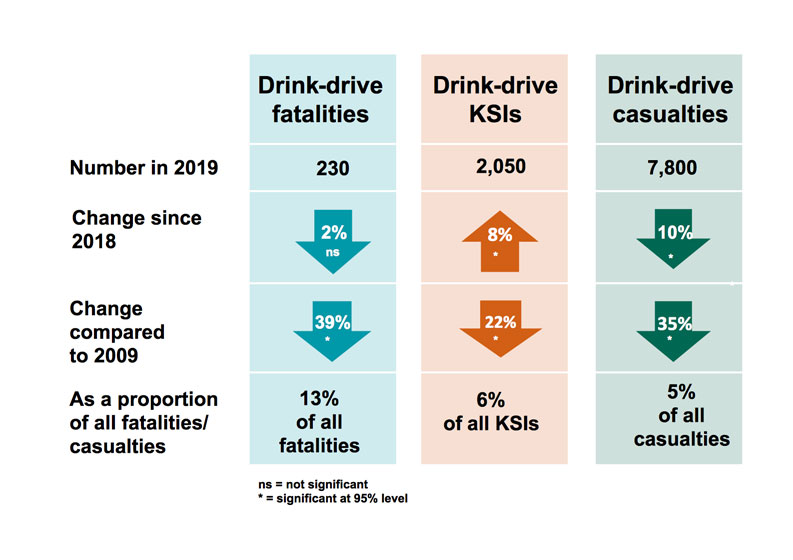
As expected, the final drink drive casualty figures for 2019 are similar to those in 2018 and the last decade – leading once again to calls for a change of approach to tackling the problem.
Final estimates for 2019 show that between 210 and 250 people were killed in collisions in Great Britain where at least one driver was over the drink-drive limit, with a central estimate of 230 deaths – a year-on-year fall of around 2%.
The DfT says this figure is ‘broadly in line with the last few years’, and ‘not statistically significantly different’ from 2018.
At 2,050 the number of KSI casualties increased year-on-year by 8%, while all casualties (7,800) fell by 10% in the same period, to the lowest number ever recorded.
The total number of collisions in which at least one driver was over the alcohol limit decreased by 9% to 5,350, which is also the lowest number recorded.
The figures prompted IAM RoadSmart to call for ‘new initiatives’- including lowering the drink drive limit, rehabilitation courses and the use of alcolocks for offenders – following ‘nine years of zero progress’.
Neil Greig, director of policy and research at IAM RoadSmart, said: “There is no one simple answer to reducing these (drink drive) figures, but IAM RoadSmart believes a much smarter package of measures is needed from the Government including a lower drink-drive limit to reinforce good behaviour, fast-track of evidential roadside testing machines to release police resources and tailored approaches to help drivers with alcohol problems.
“Rehabilitation courses work, and we believe all those convicted of drink-driving should be sent on one automatically rather than having to opt in.
“More use of alcolocks – which require the driver to blow into a mouthpiece on the device before starting or continuing to operate the vehicle – and extra penalties such as vehicle forfeiture could all be part of a more joined-up approach to the problem.
“Hard core drink-drivers are simply not getting the message, and these figures will not improve until policy changes.”
In a similar vein the RAC is calling for the introduction of interlocks to address the ‘chilling’ figures that have ‘barely fallen since 2010’.
Nicholas Lyes, RAC head of policy, said: “These figures represent a rather chilling reminder that in the region of 250 people are killed by drink-drivers on Great Britain’s roads every year, a figure that’s barely fallen since 2010.
“Clearly much more needs to do done, and one area we’d like to see progress in is around cutting reoffending.
“A report by PACTS found that nearly one-in-five drink drive offences are carried out by repeat offenders, something that could be tackled with the introduction of alcohol interlocks.”
Hunter Abbott, managing director of personal breathalyser firm AlcoSense, is also calling for the introduction of rehabilitation courses across the UK.
He said: “The fact that testing is at its lowest level on record should be ringing alarm bells. Police carried out just 285,380 roadside breath tests in England and Wales in 2019 – less than half the number in 2008.
“All convicted drink drivers in Northern Ireland are now automatically referred to a rehabilitation course – to educate them on the potential consequences of their actions. This should be introduced in the rest of the UK as soon as possible.”
All good comments above and we should think even more widely – technology, targeted enforcement, simplified legal procedures, more rapid suspension/ vehicle seizure etc. It needs a comprehensive approach – simply cutting the limit will not be enough.
David Davies, London
0